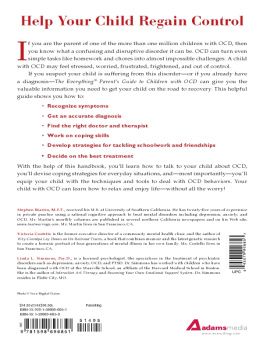Gradebusters
How Parents Can End
The Bad Grades Battle
Stephen Schmitz, Ph.D.

Baltimore, MD
Copyright 2004, 2005 by Steven Schmitz
All rights reserved.
No part of this book may be reproduced in any form or by electronic means, including information storage and retrieval systems, without written permission from the publisher, except by a reviewer, who may quote passages in a review.
Published by Bancroft Press (Books that enlighten)
P.O. Box 65360, Baltimore, MD 21209
800-637-7377
410-764-1967 (fax)
ISBN 1-890862-39-8 paper
Library of Congress Control Number: 2004113557
Cover and interior design by Tammy Sneath Grimes
www.tsgcrescent.com, 814.941.7447

To my mother, Evelyn Schmitz, and my mate, Patricia Walkergood mothers who have moved on to lead vibrant and fulfilling lives
ACKNOWLEDGEMENTS
I would like to acknowledge the following people: Robert Sherman, Ph.D., and Rodman Webb, Ph.D., two men who instilled in me a passion for education and writing; Bancroft Presss Bruce Bortz, who motivated me to finish this book; the staff of William Lyon School at Orangewood Childrens Home, and especially Barbara Blasco, who reminded me of the importance of quality in education; and Patricia Walker, for her suggestions, support, and patience.
I also need to acknowledge the invaluable contributions of the parents I have coached, and my many university students who have taught me more than I taught them. I am truly blessed to have worked with so many individuals who contribute positively to the lives of children.
INTRODUCTION
Self-help books often disappoint the people who buy them. Looking for practical advice and detailed instructions, readers are often introduced to a world of pop psychology, therapeutic introspection, and new-age mysticism, when all they wanted were some simple instructions for fixing a problem. They read on and on, but come away with only vague, flimsy ideas for problem solutions. I have written this book not as a theoretical text, but as a highly practical and usable action plan.
Throughout my years as a counselor and parent trainer, I have been amazed at the degree to which school problems can affect homes and families. Many times, I have dealt with well-meaning parents agonizing over the lethargic school performance of their kids, and fretting endlessly about their childs future career, college, and success. But while participants in my parenting classes often anguished over the bad-grade mess, their children took failure lightly, resenting and complaining about their parents interference. Tragically, the most responsible parents suffered the greatest, and their homes were filled with arguments, shouting, threats, punishments, and even late night tears, but adolescent attitudes and school grades refused to budge. Finally, parents and I began to share practical ideas about bad grades, and found solutions to the problems surrounding apathetic learners.
I have worked with many sorts of clients: juvenile delinquents, post-incarceration addicts and alcoholics, parents of children with behavioral disorders, abandoned and abused adolescents, disturbed children, teen gangsters, and families of autistic children, among others. Working in educational and therapeutic services is a wonderful and rewarding career. At first, some clients are angry, resentful, and filled with anxiety. Many face seemingly insurmountable emotional and social problems. Others seem downtrodden and despondent, wondering if there is a reason for living. Months later, I see the same clients again, and I feel like I barely know them. Their eyes sparkle. Their speech is filled with merriment and laughter. They tell me about their successes, victories, and blossoming relationships. Their lives are marked with passion and vigor. Life has become interesting and fun again. They seem truly reborn.
There are failures, too. My daughter recently ran into a client, Roland, whom I had met in a recovery center. Jogging in the park one day, she recognized and approached him. Roland was homeless, confused, and sleeping under the bushes. For several days, I searched the same park for him, but to no avail. I contacted the local sheltersalso to no avail. His arrival in my daughters neighborhood park, and his subsequent mysterious disappearance, still haunt me. I wonder what went wrong in Rolands life to cause his relapse into misery.
Counseling is a high stakes business. People come to a therapist because they are unhappy and want to live joyously. Many clients spend miserable years full of anxiety and turmoil. They never realize that the real source of happiness and contentment lies within. It is the therapists job to tap into that inner source of contentment.
As a beginner, I arrogantly thought that therapeutic successes were the result of my expertise. I blamed myself and felt responsible for failures like Roland. I saw myself as a sort of psycho-mechanic, capable of removing destructive emotions and installing better ones, like a garage mechanic might take out a leaky radiator and put in a new one.
With experience and maturity, I have come to realize that the client does the work and effects the change. Therapists provide guidance, but clients create their own emotional health.
For clients, the work of change is difficult. Yet, they must be willing to produce change if they are to embrace the new, better life they seek. Holding on to old habits, ideas, and values wont work because they are the very mental liabilities that got them into trouble in the first place. Therapists and social workers can often tell which clients are going to make rapid progress because they are the ones who seem ready to accept the necessity of change, regardless of how uncomfortable it may be.
Change is especially difficult for dedicated parents because they are willing to sacrifice and tolerate anything for their kids. It seems ironic, but the most hard-working and idealistic parents are the toughest clients because their notions of good parenting, backed by their passion and dedication, are so inflexible.
Parenting is a hard job for all of us. I believe that there is no right way to parent, because there is no single sort of child. Most parents experience success in some areas of child-rearing, and suffer failure in others. Every child is unique. A struggle with poor grades does not reflect on your parenting skills. You are not struggling alone. Bad grades are a common problem, and they probably are not your fault.
But, you do have the ability to face the facts and decide you are ready to accept change. You can put the bad-grade mess behind you and get on with enjoying the better things in life. The beginning lies in recognizing that you have innocently allowed negative habits and ideas to influence your relationships with your kids, and that organizational and attitudinal barriers stand in the way of your childrens progress. They must be removed.
My most liberating moment as a parent was when I realized that I needed to change certain things. I did not have the power, or the right, to control my childrens development, or to raise them in my own image or likeness. Yet, I could set limits to ensure my own emotional health. I could control my relationships with my children to secure and cultivate my own sense of well-being. Good mental hygiene was my responsibility and my right.
If school grades are causing you stress, anger, and anxiety, isnt it time you took care of yourself, too? You can take charge of your emotional health and cultivate your own sense of well-being as soon as you take charge of your childs education. But, you must accept change if you are to embrace the new, better life that you seek. Havent you had enough? There is a way out, and the time to find it is now!










